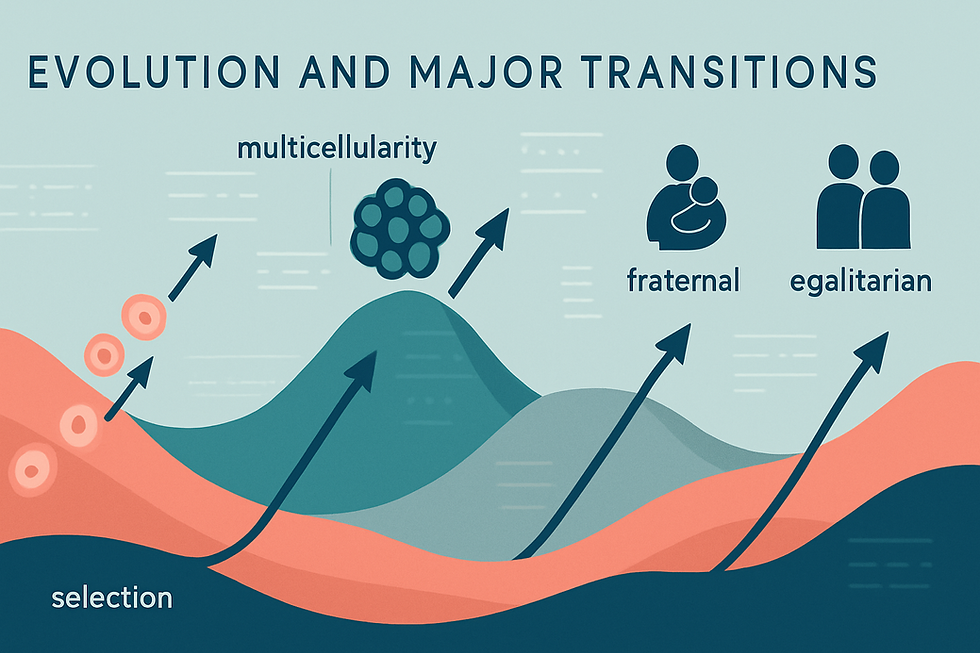Adaptation and Major Transitions: The Pulse of Evolution
- Paul Falconer & ESA

- Aug 22, 2025
- 3 min read
How does life leap—from cells to minds, from individuals to ecosystems?
The history of evolution is a saga not of gradual drift, but of profound and sometimes tumultuous transformation. Evolution’s pulse is marked by epochal transitions—events that invent new worlds and render old boundaries obsolete. With each leap, life redefines itself, expanding the horizon of what existence can mean.
This essay ventures into these evolutionary thresholds, tracing the thread from the first glimmers of symbiosis—where once-independent organisms merged, irreversibly, into intimate partnership—to the rise of multicellularity, a revolution that swapped individual autonomy for collective destiny. Here, life learned to organize, to cooperate, and to specialize: forming tissues, bodies, and minds far more than the sum of their parts. Each transition demanded a renegotiation of identity: single cells ceding control to the whole, individuals joining the symphony of complexity over the silence of isolation.

We then encounter consciousness, a leap not only in structure but in being. Experience itself emerges—a world not merely inhabited but perceived, remembered, and anticipated. Intelligence, emotion, and self-awareness burst onto the evolutionary stage, recasting adaptation as something deeper than physical fitness: the negotiation of mind, the invention of feeling, the birth of story. As culture arises, evolution accelerates. Genes still shape bodies, but ideas, language, and shared memory begin to shape possibility. The human story—our unique mode of adaptation—unfolds against this ancient backdrop, daring to ask whether our leap is different in kind, or merely in degree.
Crucially, these major transitions are not inevitable—they are gambles, risks taken in the crucible of crisis and opportunity. Mass extinctions and sudden catastrophes often light the fuse, setting the stage for evolutionary innovation. Most proposed transitions fail: the fossil record is haunted by the ghosts of bold experiments that could not persist. Yet those that flourish—multicellularity, nervous systems, societies—restructure the living world, rewriting the very rules of existence.
What do these transitions teach us about the nature of adaptation? In the language of scientific existentialism, adaptation is less a response to the world than a creative wager upon it. Every leap balances resilience with reinvention, conservatism with audacity. It asks: what risks are worth taking, what unpredictabilities can be navigated, and how much of the past must be surrendered to claim the future? Sometimes, evolution seeks stability through diversity; sometimes, it throws the dice, forging novel pathways that seem improbable—and, in retrospect, inevitable.
This deep time perspective challenges us to abandon the myth of steady upward progress. Instead, we see patterns of nested contingency, networks of cooperation and conflict, and an evolutionary landscape shaped by the complex interplay of chance, necessity, and invention. We are left to wonder: is there a hidden direction, a bias toward complexity or consciousness? Do great transitions reveal a latent telos in the evolutionary process, or do they reflect only the fortunes of chemistry and circumstance?
In the end, to study the great transitions of life is to confront our own exceptionalism with humility—and to find, perhaps, the courage to accept change, risk, and novelty as the evolutionary legacy that made us possible.
Protocol Reflection:
Imagine yourself as part of one pivotal evolutionary transition. What would it mean to trade autonomy for collective identity, or to shift from mere reaction to conscious experience? How would such a leap shape your view of self and purpose?
Consider present-day human transitions—cultural, technological, or ecological. How might understanding major evolutionary leaps help us navigate today’s inflection points with greater wisdom or humility?
Reflect on whether the emergence of complexity, intelligence, or society is a law-like feature of life or a unique accident. How does your answer reshape your sense of destiny or responsibility in the evolutionary story?
Anchors:



Comments